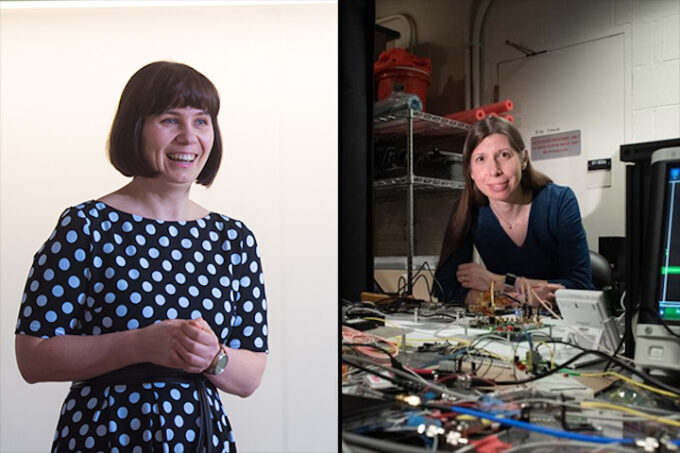Anna Mikusheva and Kerri Cahoy honored as “Committed to Caring.”
Read this at MIT News
Graduate students credit MIT associate professors Anna Mikusheva and Kerri Cahoy for their uplifting and fierce support, which buttresses them during the trials of the PhD process. The faculty members have been honored as “Committed to Caring” (C2C) for their compassion and staunch advocacy for graduate advisees. They steadfastly guide students in developing research capabilities and launching careers.
Anna Mikusheva: respect first
Anna Mikusheva is an associate professor in the Department of Economics. As an econometrician, Mikusheva’s research focuses on improving the reliability of estimation techniques that economists use. In particular, she develops new methods of statistical estimation and inferences. These methods work robustly even when the data have a low signal-to-noise ratio with regard to structural economic models.
Mikusheva is a past recipient of the Elaine Bennett Research Prize, which recognizes outstanding research in economics by a woman at the beginning of her career. She holds PhDs from both Harvard and Moscow State universities.
Dedicating time
Students attest to Mikusheva’s remarkable generosity with meetings and mentorship. One student mentions Mikusheva devoting considerable time and energy to preparing them for the job market. “She went with me from the place where I could not combine two sentences to a coherent 30-page draft. She does that [for] everyone who asks her for help.”
In preparing students for an academic lifestyle, she is also is committed to accurately conveying to her students what to expect. Mikusheva writes, “it is crucial to share the challenges and questions I am facing in my academic life … with students, as they tend to put a lot of pressure on themselves to be perfect or do exceptionally well.”
Further, Mikusheva helps explicate norms about the field to those who may face obstacles. According to a nominator, Mikusheva “demonstrates how women can excel in this male-dominated field … [while being] honest about the challenges [women] face.” In particular, Mikusheva prepares students for “delicate questions” they may encounter during job searches. Providing informal advising about the system of academia is a C2C Mentoring Guidepost.
Confidence in student capabilities
Mikusheva has a deep regard for her students, describing them as “wicked smart … very, very talented.” She acknowledges their expertise and “trust[s] their judgment,” according to her nominators. This comes through clearly to students. They mention feeling validated and having renewed energy to pursue their research based on Mikusheva’s support.
Mikusheva is keen to advance student ideas. She writes, “I prioritize independence and creativity.” Her emphasis is on positive feedback, finding students are remarkably capable, though often lack confidence. “It’s important to have a trusting mentor who believes in you,” she says.
Empathetic about the difficulties of working in isolation during the Covid-19 pandemic, Mikusheva habitually reaches out to students. She recognizes the difficulty of maintaining focus and connection. As a result, Mikusheva thinks it is incumbent on advisors to “be proactive” in connecting with students and meeting regularly. She opines, “checking in about how life goes is very valuable and maintains a positive relationship.”
Kerri Cahoy: launching kindness
Cahoy is an associate professor of aeronautics and astronautics, with a joint appointment in the Department of Earth, Atmospheric, and Planetary Sciences. She leads the Space Telecommunications, Astronomy, and Radiation (STAR) Laboratory.
The STAR lab develops satellite instruments and technologies for applications such as observing weather systems on Earth, imaging exoplanets, optical communication, and understanding the effects of space radiation. The lab’s research often involves technology demonstrations on shoebox-sized satellites called CubeSats.
Profound warmth
In the words of one of her nominators, Cahoy “launches more space missions than any other AeroAstro professor, yet remembers the needs of all her graduate students,” which have included such challenges as mental blocks around research, deviated septum surgeries, engagements, housing issues, miscarriages, infertility struggles, and many more. Nominators emphasize the manifold ways Cahoy uplifts her students.
Cahoy demonstrates remarkable compassion when students are struggling. On occasion, Cahoy has encouraged international students to visit home in particularly wearing times. In one case, Cahoy even funded a student’s trip home after their father suffered a serious car accident.
One nominator remarks on support at a particularly vulnerable moment. The student had been “hiding her pregnancy because of potential negative reactions” from male colleagues. Cahoy guided the student through her parental leave options, “what the first few months [would] be like … and even threw … a surprise baby shower.”
Achieving balance
Transparency matters to Cahoy. She emphasizes, “I don’t try to hide that I’m a real person with conflicting priorities.” In doing so, Cahoy provides a model for how to balance work and life priorities, a C2C Mentoring Guidepost. When a student is overwhelmed, she works with them to redistribute and lower their workload, according to nominators.
In the midst of Covid-19, Cahoy works with students to build resilience and is empathetic around the stress they are experiencing. Cahoy emphasizes “celebrating what we can get done and not dwelling on what has to go on the back burner” as well as trying to focus on smaller, more manageable tasks.
Nominators describe Cahoy as a “staunch advocate.” She devotes considerable time and attention to helping students network to advance their research and careers, recommending them for awards and opportunities, and encouraging students interested in industry to take summer internships.
Cahoy also speaks of her appreciation for neurodiversity, recognizing people’s varying needs and talents. She writes, “truly there are an infinite number of possible combinations of skills that individuals have and different ways that we communicate and process.” With the wealth of talent and the pace of research efforts at MIT, many “get saturated and [do] not have or maintain the buffers we need to appreciate different people’s capabilities and perspectives.”
To that end, Cahoy advises that each person cherish interactions across neurodiverse boundaries.
Committed to caring for MIT graduate students
The Committed to Caring program is an initiative of the Office of Graduate Education and contributes to its mission of making graduate education at MIT “empowering, exciting, holistic, and transformative.”
Since 2014, C2C has invited graduate students from across MIT’s campus to nominate professors whom they believe to be outstanding mentors. Selection criteria for the honor include the scope and reach of advisor impact on graduate students’ experiences, excellence in scholarship, and demonstrated commitment to diversity and inclusion.
The most recent outgrowth in 2019 took the form of a Faculty Peer Mentorship Program, in which C2C faculty act as peer mentors to incoming MIT professors. The program provides one-to-one matches with the goal of fostering strong mentorship practices and providing a network of support.
By recognizing the human element of graduate education, C2C seeks to encourage excellent advising and mentorship across MIT’s campus.
Story Image: Anna Mikusheva (left) is an econometrician whose research focuses on improving the reliability of estimation techniques that economists use. Kerri Cohoy (right) leads the Space Telecommunications, Astronomy, and Radiation (STAR) Laboratory. Credits: Gretchen Ertl and David Sella



